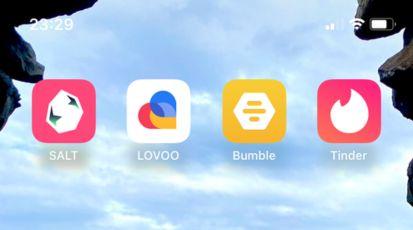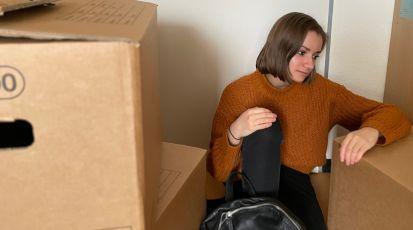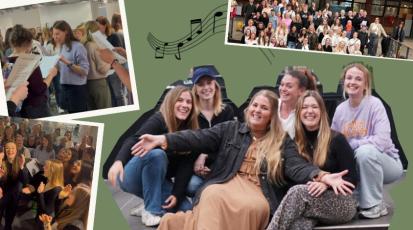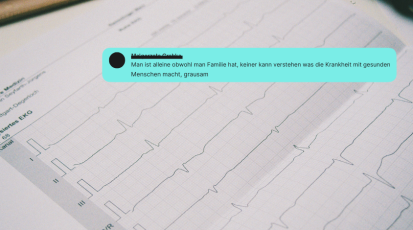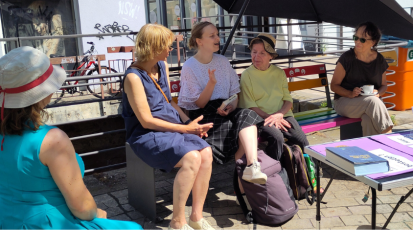‘That friendship application helped me so much to feel less lonely.’
Like, chat, connect – the future of making friends?
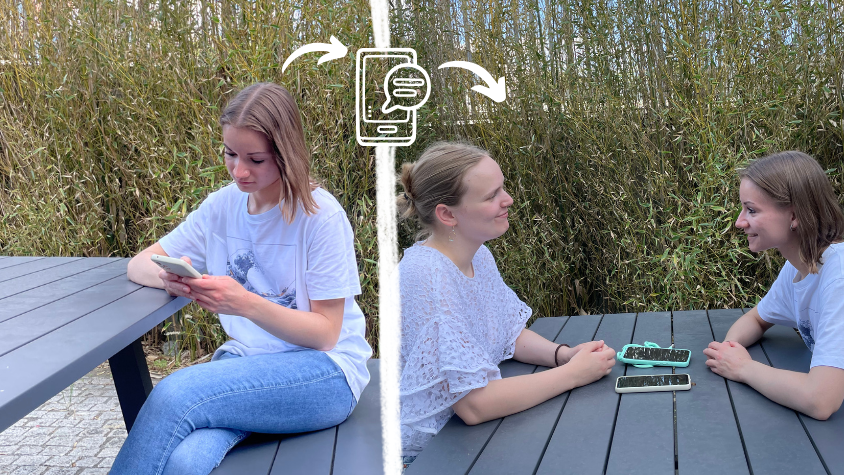
Friends are essential emotional and social support systems. In this digital age, Generation Z doesn't only try to build friendships where they study or work. According to a 2023 Bumble For Friends survey, 66 percent of Generation Z respondents report having met their friends online. The survey among over 1.000 US adults found that 62 percent of respondents shared that making new friends online has helped them feel less lonely.
Loneliness versus isolation
While there are several definitions for the term, loneliness is often defined as a negative personal experience. This subjective perception can originate from the feeling that one's social relationships are of low quality and / or that one has few social connections. Therefore, a person’s social needs might not be met. There are various types of loneliness: Emotional loneliness comes from the feeling that one lacks a meaningful relationship, like a significant other or a close friend. Social loneliness is the experience of having an insufficient wider social network, which can include friends, neighbours or colleagues.
Isolation, on the other hand, can be determined by the number of a person’s social contacts. Such an objective social isolation can therefore be considered as a measurable state.
sources: EU Science Hub, National Library of Medicine, Bertelsmann Foundation
More stories on loneliness and connection by international students can be found by following this link!
But not only apps seem to become popular to make friends. Young adults also turn to TikTok, posting ‘friendship applications’. Some of these videos have thousands of views, with people connecting in the comments.
This suggests that the way those born between 1995 and 2010 make friends could increasingly shift towards the digital world. But is that really the case? And how would that shape the future of making friends?
What are Bumble For Friends and friendship applications?
Bumble For Friends is a standalone app to build friendships that works with the same principles as the dating mode version of Bumble. Users can swipe right if they like a person’s profile and left if they don’t consider them a match. If another person swipes right on your profile too, you will be able to chat with each other.
Friendship applications are short videos with which users of social media platforms like TikTok try to make new friends by introducing themselves to their community. Usually, a person says where they’re from, if they are a student or have a job, what they like to do in their free time, what they’re passionate about, and what they look for in a friend.
sources: Bumble For Friends, TikTok
The present
While currently, emerging adults virtually stay in touch with their friends via social media platforms and messenger apps, they typically experience various in-person interactions. A study published in the journal Frontiers in Developmental Psychology suggests that friendships are co-constructed across contexts. This means that online environments can be an extension for friendships built offline, maintaining the relationship both digitally and in person.
Looking ahead, media and communication scientist Jeannine Teichert believes that it is unrealistic to expect that making friends will exclusively shift to the online world in the near future. But: ‘It will increasingly shift to the media and digital space. As the media environment increases, more and more media is gradually used. And of course that also has an impact at a stage when you're building friendships.’ However, Teichert points out that ‘at the moment, we simply don't have that much data, as some of Generation Z are still so young.’
What if it works?...
Nevertheless, a future of making friends online might not seem too unlikely. Teichert thinks, ‘A best-case scenario is that you can really achieve this transformation from online to offline contact.’
One who succeeded at doing so is Georgie Pitkethley. The 23-year-old moved from New Zealand to Cardiff in September 2024, as her partner got a job playing rugby. Not knowing anyone in Wales, she posted a friendship application on TikTok to meet new people. ‘I had heaps of people commenting, and I think I ended up having about 300 message requests.’ Teichert notes that apps and social media platforms have made it easier to socialise these days. ‘If you use TikTok or other social media platforms, you can reach lots of other people who are generally in the same age group.’ If users are around the same age, share the same gender (identity), and are from the same country, a friendship is more likely to develop. Those who share at least one demographic trait are on average about three times more likely to become friends compared to the ones who do not share any of those similarities.
Trying to find like-minded peers on social network platforms doesn’t happen randomly. Users make a conscious decision, like Georgie did by posting her friendship application.
Even before meeting in person, frequent computer-mediated communication can stimulate the feeling of being close to someone. Disclosing personal information and asking each other questions makes you learn about one another, which might boost social attraction. Bumble, for example, can also stimulate reciprocal self-disclosures between two users communicating.
According to media and communication scientist Jeannine Teichert, ‘trust, reliability, and consistency’ are particularly important for an acquaintance to develop into a friendship. ‘These are criteria that can also be found in online forums and social media.’ She additionally explains, ‘If you really want to have a friendship beyond the online context, you have to meet in real life at some point.’
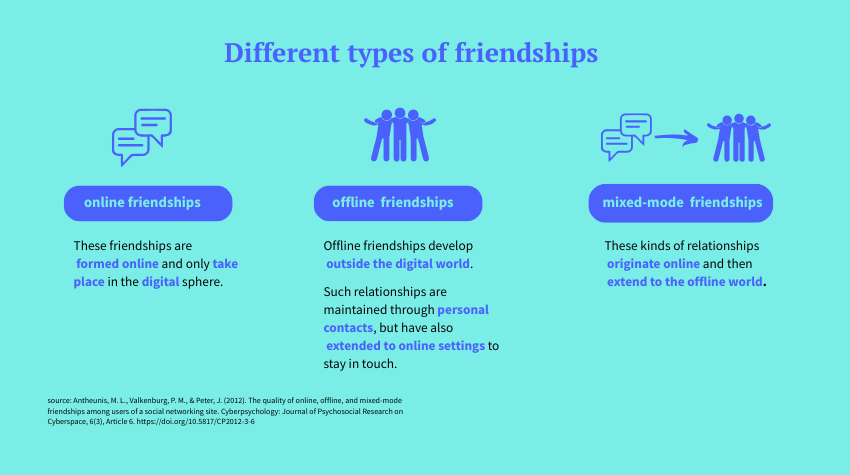
A paper published in the Journal of Social and Personal Relationships found that it takes about 40 to 60 hours in the first six weeks after meeting someone to form a casual friendship. These figures may of course vary.
Georgie exchanged a few messages with some of the people she met online, meeting up with them in person soon after. ‘The amount of coffee dates I went on, like two weeks after I posted that video, was insane, and it was so fun to meet new people. I loved it.’ Georgie is sure, ‘That friendship application helped me so much to feel less lonely. There’s one girl, we’re so close, she’s probably one of my best friends now.’
The 23-year-old even recommended posting a friendship application to one of her friends who had recently moved to Australia. ‘She did, and the same thing happened, she met so many girls through it as well, so it seems to work.’
…What if it doesn’t?
But of course, projecting a future where young people increasingly make friends online may be affected by the current downsides of the digital world. Teichert notes, ‘There’s also a fear of missing out if you’re not online all the time. If you have the feeling that you are only connected via media platforms, feelings of exclusion or loneliness might set in. It’s precisely when the device is switched off that you might feel like you no longer have any contact with anyone.’ And when the phone is switched on, social media platforms and friend-finding apps influence the framework for communicating and building relationships.
‘If you have the feeling that you are only connected via media platforms, feelings of exclusion or loneliness might set in.’
For example, Bumble For Friends offers AI icebreakers that recommend three prompt ideas if you struggle to start a chat. Users can edit the prompt before sending it. The app also makes it possible to avoid confrontation easily by just unmatching someone.
Projecting an online approach to making friends, does this mean that Generation Z’s social skills will decrease?
A study published in the International Journal of Advances in Engineering and Management explored the effects of social media use on the development of social skills among 13- to 19-year-olds from the US, UK, and India. The findings suggest that relying on social media platforms to communicate with each other may hinder essential social skills from developing properly. These include reading body language, interpreting tone, and the ability to engage in meaningful face-to-face conversations.
Auch interessant
Currently, Teichert does not see any serious risks in young people meeting friends online, ‘as long as you still keep an eye on the fact that you’re not just sending emojis to each other, but still engage in dialogue.’ She further points out that it is not yet possible to adequately assess how young people’s interpersonal communication skills change as a result of meeting friends online. ‘A lot of things still take place offline, such as school, university, and work. So you still meet people offline. We are not yet in this fully digitalised world where we no longer have to leave the house.’
What is already known is that social media offers opportunities to strategically present oneself online. Throughout the psychological process of self-identification, people develop both private and public images.
Does this make online approaches like friendship applications less authentic?
Georgie thinks, ‘It just depends on the person, because some people can be so different online, but there’s also the other side, where people can be very authentic and can be exactly who they were in the video.’
Trying to grasp what lies ahead
While the future might hold different scenarios for the consequences of Generation Z possibly making friends online, some things are already clear: To bond with someone, it’s not important where a friendship is formed, but rather that this relationship shifts towards cue-richer communication. Face-to-face interactions in offline settings will remain important. Relationships develop over time, no matter if it’s an online, offline, or mixed-mode friendship.
The key point is to maintain it.
If you are struggling with loneliness yourself, there are various services where you can get help at any time. In Germany, for instance, you can find a list of support centres via the ‘Kompetenznetz Einsamkeit’ website.
An international offer is ‘Find A Helpline’, a tool that connects people in over 130 countries with certified counselling services that can be searched by topic –including loneliness.



